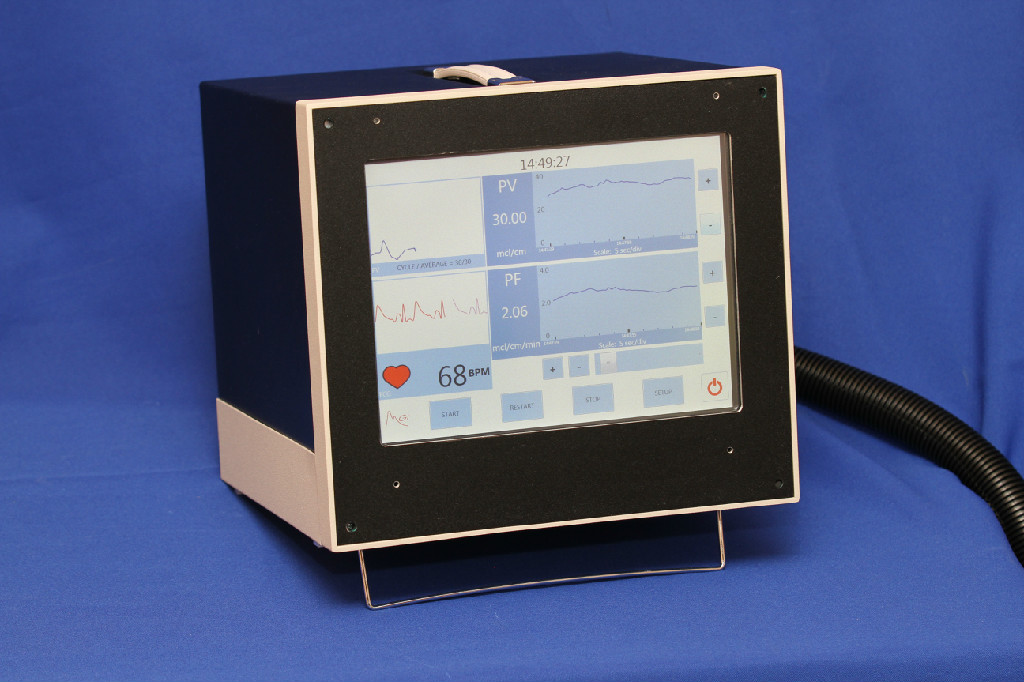
Business Opportunity
MGI Medical, LLC is a New Jersey company that was formed to commercialize a medical instrument called a "Pulse Flowmeter." When Dr. Marks, the founder of MGI Medical, was a medical student he witnessed the death of a patient caused by undetected internal bleeding following a minor surgical procedure. He felt that there had to be a way to detect that this was happening using a technological solution. Over the following years, he developed the Pulse Flowmeter, which would almost certainly have prevented the death of this patient.
The Competition
While there are devices that can assist physicians in the assessment of hemorrhagic shock, almost all of these are invasive technologies, must be used by skilled technicians, are lagging indicators, and/or provide questionably useful information. There are no direct competitors to the Pulse Flowmeter as it is the only device that provides robust, noninvasive, safe, and continuous measurement of peripheral blood flow. The technology is protected by 7 US patents (and one pending) and by extensive technical know-how.
MGI Medical is owned by Dr. Lloyd Marks and three partners who are also the principals of General Devices (GD), a leader in mobile telemedicine for 30 years. GD has developed the current version of the Pulse Flowmeter for MGI Medical. Two million dollars of personal funds have been invested to date. Dr. Lloyd Marks, the founder and Chief Medical Officer, is the former Chief of Pediatric Cardiology at the Children's Hospital of New Jersey, an MIT-trained electrical engineer, and an inventor with 22 medical device patents and an MBA.
We have an excellent team with an established track record. Curt Bashford, the CEO of GD. Gregory Lowe, MGI's Chief Technology Officer, is the Director of Engineering at GD. Bin Zhu, Ph.D. is our Chief of Software Development.
Although we have proven that the Pulse Flowmeter can detect just 10% blood volume loss in blood donors, we need to do clinical trials to determine how it will perform in an actual clinical environment, where decisions may be made based on its measurements. We will be testing the Pulse Flowmeter in ER’s where a reasonably high incidence of GI bleeders require intervention and on post-operative hip fracture patients who, on average, have 1 liter (2 units of blood) of occult postoperative blood loss, requiring multiple blood transfusions and/or trips back to the OR. Approximately 1% of the population (3 million people) undergo hip fracture surgery annually.
These studies will provide the statistical power necessary to show how the device can detect ongoing blood loss in a busy clinical environment This information may prevent unnecessary hospital admissions for many GI bleeders (about $1 billion/year) and the high costs associated with transfusion and reintervention for postoperative bleeding.
Also, importantly, the Pulse Flowmeter is a “platform technology.” We have recently filed a patent for a screening instrument to be used by primary care physicians to diagnose peripheral vascular disease that makes use of our technology. Furthermore, the instrument may prove useful in monitoring heart failure patients after they have been discharged from the hospital to see if they are slipping back into heart failure at home; this allows their medications to be adjusted to prevent early readmissions (which are not paid for by Medicare).
MGI Medical is immediately seeking funds to develop a mass-producible, disposable electrode, to develop a new portable version of the Pulse Flowmeter that will be suitable for large-scale manufacture and to obtain FDA approval. We project that the company will have self-sustaining revenue after 3 years. The anticipated exit strategy is by sale to a large medical device company after 5 years. We have excellent IP protection and there are no direct competitors.
The Pulse Flowmeter meets a specific, well-recognized medical need in a large market. It provides an ongoing source of revenue because it uses a disposable electrode. MGI Medical has an excellent management team and a plan to achieve profitability by the third year of operation. We believe that MGI Medical will be an attractive target for buyout by its fifth year of operation.
Contact Lloyd Marks, MD, MBA, FACC at (908) 347-2662 or lmarks@mgimedical.com.
